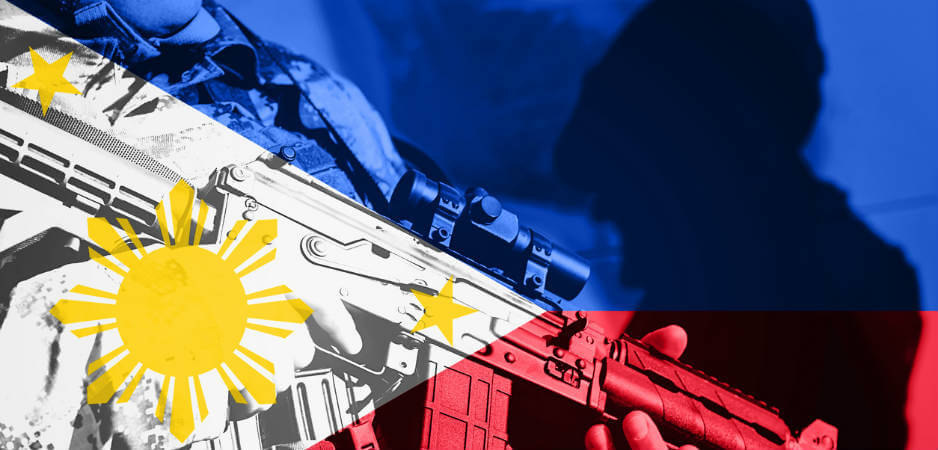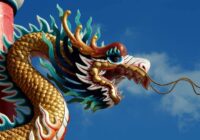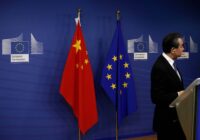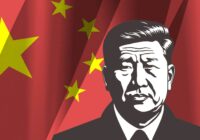In this guest edition of The Interview, Peter Isackson talks to Philippine Senator Antonio Trillanes IV.
On June 6, a Philippine delegation to the International Criminal Court (ICC) led by Senator Antonio Trillanes IV and Representative Gary Alejano, accompanied by the lawyer Jude Sabio, lodged a formal complaint against Philippine President Rodrigo Duterte for crimes against humanity based on his policies and practices concerning drug dealers and addicts.
Since taking office on June 30, 2016, Duterte has launched a brutal war on drugs that, according to Human Rights Watch, has seen more than 7,000 deaths, many indiscriminately carried out by vigilante gangs, with jails teeming to the brim with drug offenders. The scope and brutality of the campaign is such that The New York Times photographer Daniel Berehulak, who had covered wars in Iraq and Afghanistan, as well as the 2014 Ebola epidemic in West Africa, was led to describe it as “a new level of ruthlessness.”
In this guest edition of The Interview, Peter Isackson talks to Senator Trillanes in Paris about the legal, political and cultural aspects of the procedure engaged.
Peter Isackson: Can you tell us about the initiative you’ve taken with the ICC in The Hague, how that came about and what you accomplished there?
Antonio Trillanes IV: On June 6, we filed a supplemental communication with the international criminal court. I call it supplemental because we basically affirmed the previous communication filed by one Filipino lawyer, Jude Sabio, so we affirmed all those that were enumerated in the communication and we added some updates to include cases that happened even after that initial communication. We also filed it because of the railroading of the impeachment complaint, which is basically the last addition for us to prosecute President Duterte, because our president has immunity. So with the junking of the impeachment, there are no more avenues within our judicial system to prosecute him and, therefore, the ICC can step in.
Isackson: What are your expectations of the ICC, which must determine the incompetence of local institutions to prosecute something that can be considered a crime against humanity? Do you expect that can happen and, if it does, how long will it take and how complicated will it be?
Trillanes: We have studied the different policy papers of the ICC and the process. It’s not accurate to call it incompetence. It states that the required condition is that the state party is unable and unwilling to prosecute. And in their policy papers inability includes immunity from suits, which is what we have with our system in the Philippines. So, the president being immune from suits, the Philippines is unable to prosecute except when he is impeached.
Isackson: When you say Duterte has immunity — it’s in the constitution of the Philippines that impeachment is a legal procedure, so presumably the court will assume that it’s not impunity to the extent that the House of Representatives has voted on impeachment and the Senate has approved. I have a statement from Aquilino Pimentel III, the Senate president, who said the upper house of Congress respected the House’s decision to dismiss the accusation and called on the public to respect the committee’s decision. Now from the ICC’s point of view, aren’t they likely to say that it isn’t immunity because Duterte was exonerated by the institution that had the power to judge him?
Trillanes: One component is inability. So you need to impeach first. But because the House of Representatives is packed with Duterte allies, and the way they railroaded the impeachment showed unwillingness on the part of the state and its organs to prosecute, because the impeachment complaint was junked without even being given a chance for the complainer to present evidence. The reasons cited were flimsy. And, therefore, it is included in the submission to the ICC. And again, part of their policy paper shows that it’s the state party that must demonstrate its willingness to prosecute. They must exhaust all means. It’s not us. It’s the state. They must show that they are not conducting investigations just to clear the accused.
Isackson: What actions can the ICC take? Can you bring Duterte to trial? We’ve seen that’s extremely difficult to do, even in cases of genocide.
Trillanes: There have been cases where the ICC have been able to prosecute former heads of state who are guilty of crimes against humanity and genocide. And there are some who still have pending arrest warrants, and these people have been limited to either staying within their country or going to countries that are not state parties to their own statutes. Now let me just say that we have totally studied the process of the ICC. We have a solid case and, if the ICC is true to its mandate, then once the state party is unable and unwilling to prosecute for the most serious crimes that are covered under their own statutes, then they can step in.
According the experts, after the initial analysis of the communication, they will decide if the case warrants further analysis or gets shelved for lack of evidence for the time being. Then, after that, they will decide to initiate a preliminary examination. From then on they will decide the jurisdiction and admissibility. As far as jurisdiction is concerned, the Philippines is a state party since August 2011, if I’m not mistaken, and if the crimes alleged are covered or happened after the entry into force of the Rome Statute with the state party, then it’s covered by the jurisdiction. We call that temporal jurisdiction.
The next one is material jurisdiction. If the crime alleged — in this case, crimes against humanity — is covered under the Rome Statute, which it is, and based on the definition of crimes against humanity, it is a systematic and widespread attack directed against a civilian population. We have that. We have thousands of documented cases of extrajudicial killings that happened across the country that were executed in a very similar pattern. As far as material jurisdiction is concerned, it’s covered.
Then finally there is personal and territorial jurisdiction. The crimes alleged happened within the state party and Duterte is a Filipino citizen, so that satisfies this matter. Then you go to the complementarity clauses. We should have demonstrated that the state party wasn’t willing and unable to prosecute, as I mentioned earlier; then to include the gravity of the offense. We are talking about thousands of people dead, so that would speak for itself. After that, the prosecutor would request to initiate investigation. Once that happens, they can also request for the issuance of a warrant of arrest.
Isackson: What agency can actually proceed to the arrest of a political leader?
Trillanes: It’s a state party, so it’s either the law enforcement, the Philippine national police or the armed forces.
Isackson: Do they receive orders directly from the international court?
Trillanes: As a state party, we are mandated to follow the ICC as part of our international obligation.
Isackson: But if Duterte has all the power, how can that take place?
Trillanes: Theoretically, he can direct if he still has the loyalty of these parties by the time of the issuance of the warrant of arrest.
Isackson: So your complaint at the ICC is based on extrajudicial killings. We know that other governments do that. When [Donald] Trump was interviewed by Bill O’Reilly concerning [Vladimir] Putin’s extrajudicial killings of journalists and opposition politicians, he admitted that “we’re not innocent,” speaking of the United States. The ICC is certainly aware of the fact that extrajudicial killings are not a total exception. In the Philippines, it isn’t a case of genocide in the classic sense, since it’s targeting certain types of people who can be considered criminal in the government’s eyes.
Trillanes: Well, that’s precisely why the Rome Statute defines specific crimes and one of them is crimes against humanity, genocide is another, and there are other kinds. In our case, it is clearly covered under crimes against humanity, and if you’re talking about five or 10 people, probably you can say that it’s well within the tolerable limits of any decent society, but if you are talking about thousands. And these are suspects. There is no specific system of validation that will determine whether one is truly guilty of peddling or using drugs. Most countries in Europe basically legalize smoking of marijuana, but just to be suspected of using marijuana can have you listed [for assassination in the Philippines].
Isackson: I think most people in the West are totally shocked by this kind of action against one’s own population, but the question I ask myself would be …
Trillanes: Would the ICC lift a finger?
Isackson: Yes, it can’t be compared with genocide. It’s targeting people who are supposedly guilty of something, whether the justice system has identified them or not. In the West, some politicians would say that it’s “being tough on crime.”
Trillanes: If you would go through the Rome Statute, it defines certain crimes. One is genocide. The other is crimes against humanity. It is defined in a certain way. It may not be as brutal as genocide, but it is as bad or even worse. Based on government data, it has reached the 8,000 mark. Whether you call that genocide or crimes against humanity, 8,000 people dead without any due process or a system of validation, at least it’s bad.
It’s one of the reasons the ICC has been created in the first place, and the Philippines being a signatory or a state party to the Rome Statute agreed to that setup. Whenever we cannot prosecute those responsible for such crimes, whether we’re unable or unwilling as a state party to prosecute those people, then we give it to the ICC. It’s the reason for its existence. That’s why I started off by saying we did our homework, we believe we have a solid case and if the ICC is true to its mandate then we expect the ICC to prosecute Mr. Duterte.
Isackson: How would you estimate your chances of success?
Trillanes: I’m not necessarily a naive person. I know that there are external factors or circumstances that may predict the behavior of the ICC but, all things being equal, I believe our case is solid and it’s 100% that he will be found guilty.
Isackson: The ICC is constituted by member states. How important is the opinion of other states, particularly in Europe? You can’t appeal to, say, the Trump administration to back you on this. Am I wrong about that?
Trillanes: The ICC takes pride in its integrity and independence, so we’ll take it at face value that they will decide cases based on merit. That’s where we’re coming from.
Isackson: Supposing you are successful and a procedure is engaged leading to the arrest and extradition of Duterte to The Hague. How would the Philippine population react to that given that today he has 78% approval rating?
Trillanes: I believe the Filipino people will do the right thing. They will not defend a mass murderer. We’ve seen it before. We’ve seen popular leaders of the country that were exposed for corruption or other crimes, and their popularity plummeted. I don’t see Duterte being able to survive politically any investigation that would expose him. That’s why his allies in the House of Representatives quickly moved in and junked the impeachment complaint even before it reached a stage where evidence would be presented, because they know that our evidence is solid and that once presented to public, public opinion would immediately shift.
Isackson: How solid is his political majority? In case of successful outcome with the ICC, how will the political class react?
Trillanes: The political class would submit to the authority. If the ICC would be the authority, they would submit. I know [our people] well enough. In Duterte’s case I don’t see them going out into the streets blocking any judicial process to defend Duterte. They know that he is guilty of the crimes being alleged. The public preference is flimsy, not too deep or solid at this point. He may have a solid base of the population, probably at most 25%, but there is a significant number around 40% to 60% who are generally ambivalent and just interested in living their life. And these people, once they’re made aware of the magnitude of the crimes of Duterte, they [will] probably shift to the other side and in an instant the public approval they seem to be bragging about will shift.
Isackson: Would there immediately be an election?
Trillanes: There’s a constitutional succession. If for some reason Duterte is removed from office, then the vice president succeeds.
Isackson: What would happen if, in the case of Duterte being threatened with removal from office by the ICC, in six months or a year’s time, what would happen with the current vice president, and what kind of majority would you expect to be redefined around her authority?
Trillanes: Once it’s quite clear that the foundations of the Duterte administration are crumbling, Filipino politicians normally jump to the next one, to the incoming power.
Isackson: Would it be the vice president?
Trillanes: They would gravitate toward her. We have seen this case time and again: in 2000, when Erap Estrada was impeached, our former president. Then just recently the former vice president, Binay, was supposed to be the president-in-waiting, because of his very high approval numbers (85 to 90%), but when the exposés revealed that he was very corrupt, his numbers crumbled, and the politicians he was initially allied with him then started jumping to the flavor of the month. As fast as he was able to muster a majority through an alliance, it was also that fast in crumbling. That’s what we would foresee. Remember when Duterte assumed office in June 30 last year, his numbers were way up, in the low 90s? And in just a year he lost almost 20%.
Isackson: Still, it would be an enviable number for Trump, who is also concerned with impeachment. His approval rating is below 40%.
Trillanes: So the next round of surveys would be released any time now, and I imagine it will drop even further. It’s dropping quite rapidly. By the time the warrant of arrest will be issued, probably his numbers will be in the 40s. Right now Duterte is pushing for anti-poor tax measures: He’s going to tax gasoline, diesel and the others, so the poor would be hit. They will not like that. They have pinned their hopes on Duterte to make their lives better. But, quite the opposite, he’s going to make their lives difficult. That has yet to be factored and that is going to come in existence by the third quarter this year. There are reasons why his numbers should go down and there’s no reason at all why his numbers would sustain their level.
Isackson: You had three complaints against Duterte: corruption, extrajudicial assassination and his foreign policy, in particular the pivot to China. With the ICC only, one of those complaints could be used. How important for you are the others?
Trillanes: The other issues are domestic. The issue of corruption would really strike hard against the myth of Duterte. Because the Filipino people might look the other way when it comes to being a strong man or abusing human rights, but they might be as tolerant with public officials found to be corrupt. That is why we are pounding hard on the corruption issue.
That’s also the reason why he continues to evade the corruption issue because he knows that he’s very vulnerable. It’s very important. The China pivot is quite sentimental to Filipino people, especially to the armed forces of the Philippines. Historically we are inclined to be allied with the Western powers, particularly the United States. We were wired that way — even as soldiers, officers, we were patterned after the United States armed forces. It’s quite a difficult process to suddenly reorient that paradigm by 180 degrees.
So that’s where we’re at. And in the context of the issues of the West Philippine Sea, the reclaimed islands of China, which are fast becoming militarized. So you have a situation where you are going to ally with a country that is actually threatening your regional security.
Isackson: Looking at it more globally: To what extent does what Trump is doing in the US — which many take as a sign of weakness of American global influence — how does that influence even the perception amongst the military and strategic thinkers in terms of foreign policy and alignment?
Trillanes: Probably there’s some effect for the strategically-minded in the armed forces, but were talking about instincts here. The instinct of the armed forces is to look at the US as an ally and China as a potential enemy because of its communist moorings.
Isackson: It’s difficult to describe China as a communist country today.
Trillanes: I’m speaking as a former officer of the armed forces because we look at things from basically a Cold War perspective: the communists and the democratic countries. China is lumped in that Cold War image.
Isackson: You do admit that the Cold War order is no longer what it used to be, a stable confrontation between two camps. There’s a lot of give and take and movement in the balance of power, including nations such as India.
Trillanes: I totally agree, but precisely because of that Cold War image, it has created so much distrust and that has spilled over to this day. Even conducting military exercises, we can’t even do that because we can’t share allied tactical procedures and maneuvers for that matter, because it’s going to compromise our security arrangement with other capitals. These are some factors that would make it quite impossible. That’s why I mentioned going against the instincts of the armed forces to go with China.
Isackson: If something does happen that leads to Duterte’s incrimination, what role will the military likely play in whatever disruption occurs?
Trillanes: The role of the military, if we should reach that point, will be very crucial. If Duterte is running the show, why would the armed forces follow? On the other hand, if the military is true to its mandate of protecting the people and the state, and protecting and preserving the constitution, then they must enforce the arrest warrant and follow their obligation. Once that happens, Duterte would be arrested.
Isackson: The political order and the military order would be in total convergence? There would be no risk of a coup d’état?
Trillanes: They can label it as such, but if there is a warrant of arrest, there is also that constitutional mandate for us to fulfill our international obligations and effect the arrest of Mr. Duterte. That’s not going against the constitution.
The views expressed in this article are the author’s own and do not necessarily reflect Fair Observer’s editorial policy.
Photo Credit: Allexxandar
Support Fair Observer
We rely on your support for our independence, diversity and quality.
For more than 10 years, Fair Observer has been free, fair and independent. No billionaire owns us, no advertisers control us. We are a reader-supported nonprofit. Unlike many other publications, we keep our content free for readers regardless of where they live or whether they can afford to pay. We have no paywalls and no ads.
In the post-truth era of fake news, echo chambers and filter bubbles, we publish a plurality of perspectives from around the world. Anyone can publish with us, but everyone goes through a rigorous editorial process. So, you get fact-checked, well-reasoned content instead of noise.
We publish 2,500+ voices from 90+ countries. We also conduct education and training programs
on subjects ranging from digital media and journalism to writing and critical thinking. This
doesn’t come cheap. Servers, editors, trainers and web developers cost
money.
Please consider supporting us on a regular basis as a recurring donor or a
sustaining member.
Will you support FO’s journalism?
We rely on your support for our independence, diversity and quality.







